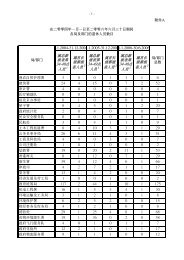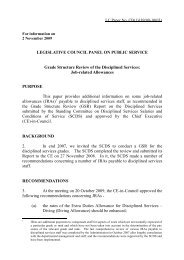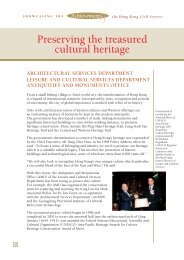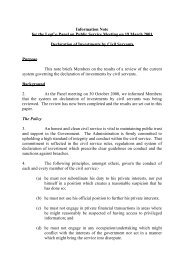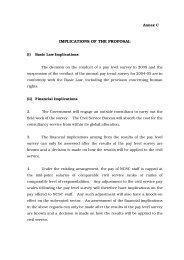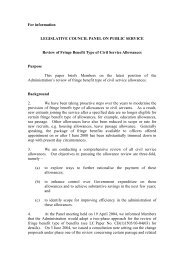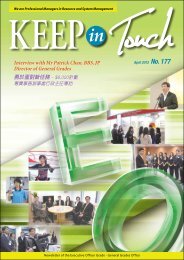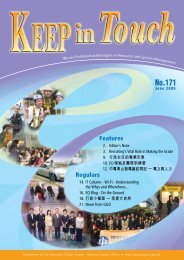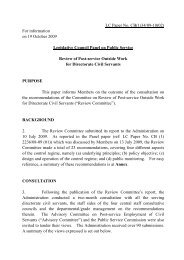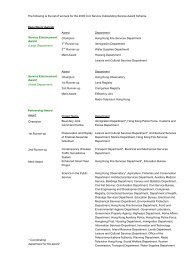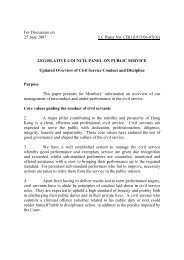Ethical Leadership in Action - United Nations Public Administration ...
Ethical Leadership in Action - United Nations Public Administration ...
Ethical Leadership in Action - United Nations Public Administration ...
Create successful ePaper yourself
Turn your PDF publications into a flip-book with our unique Google optimized e-Paper software.
<strong>Ethical</strong><br />
<strong>Leadership</strong><br />
<strong>in</strong> <strong>Action</strong><br />
Handbook for<br />
Senior Managers <strong>in</strong> the Civil Service
Table of Contents<br />
Table of Contents<br />
4 The Challenges Ahead<br />
7 Introduction of the 3As’ Strategy<br />
10 Awareness<br />
• Statutory provisions relat<strong>in</strong>g to bribery offences<br />
• Instructions and guidel<strong>in</strong>es on conduct and discipl<strong>in</strong>e<br />
• Vulnerability to corruption and malpractice<br />
28 Assessment<br />
• Nature of work<br />
• Checks and balances<br />
• Values and conduct of staff<br />
34 <strong>Action</strong><br />
• Provision of clear direction by act<strong>in</strong>g as a role model<br />
• Exercis<strong>in</strong>g monitor<strong>in</strong>g and control<br />
• Implementation of <strong>in</strong>tegrity programmes<br />
• Susta<strong>in</strong><strong>in</strong>g <strong>in</strong>tegrity promotion efforts<br />
• Align<strong>in</strong>g the people and the system <strong>in</strong> support of an<br />
ethical culture<br />
42 Appendix<br />
• List of relevant CSB Circulars, CSRs and publications<br />
Published by<br />
Independent Commission Aga<strong>in</strong>st Corruption<br />
Civil Service Bureau<br />
Hong Kong<br />
August 2000 First Edition<br />
February 2002 Repr<strong>in</strong>t<br />
February 2004 Repr<strong>in</strong>t<br />
March 2008 Repr<strong>in</strong>t
The Challenges Awareness Ahead<br />
Alert your staff to the safeguards aga<strong>in</strong>st the dangers
“Civil Service is <strong>Public</strong> Trust”<br />
Civil service is a unique call<strong>in</strong>g. We serve the public<br />
and ga<strong>in</strong> their support by earn<strong>in</strong>g their trust. Only a<br />
civil service that ma<strong>in</strong>ta<strong>in</strong>s the public trust can <strong>in</strong>spire<br />
confidence of the people. This, <strong>in</strong> turn, is one of Hong<br />
Kong’s ma<strong>in</strong> pillars of stability and prosperity.<br />
Chang<strong>in</strong>g Environment and Expectations<br />
The civil service faces tremendous changes <strong>in</strong> the<br />
new millennium. The ever grow<strong>in</strong>g needs and ris<strong>in</strong>g<br />
expectations of the community require the civil service<br />
to deliver quality service. The <strong>in</strong>creas<strong>in</strong>gly fast mov<strong>in</strong>g<br />
and complex issues faced by the community demand<br />
departments to work together quickly across traditional<br />
boundaries to deliver an effective response. A more<br />
demand<strong>in</strong>g legislature and <strong>in</strong>quir<strong>in</strong>g media place the civil<br />
service, especially senior officers, <strong>in</strong> the limelight of higher<br />
public scrut<strong>in</strong>y and accountability. The rapid mov<strong>in</strong>g<br />
technological developments call for our <strong>in</strong>stantaneous<br />
adaptation and adjustment. Enhanced productivity means<br />
more output has to be achieved with less resources.<br />
Aga<strong>in</strong>st this backdrop of changes and rapid developments,<br />
we must ma<strong>in</strong>ta<strong>in</strong> our highest standard <strong>in</strong> serv<strong>in</strong>g the<br />
community.<br />
Shared Values of the Civil Service<br />
In meet<strong>in</strong>g the challenges, we have a set of shared core<br />
values which serves as a compass to guide us through. The<br />
then Chief Secretary for Adm<strong>in</strong>istration has underl<strong>in</strong>ed the<br />
shared values at a sem<strong>in</strong>ar for senior government officers 1 .<br />
They can be summed up as six key pr<strong>in</strong>ciples:<br />
(a) commitment to the rule of law;<br />
(b) honesty and <strong>in</strong>tegrity above private <strong>in</strong>terests;<br />
<br />
(c) accountability and openness <strong>in</strong> decision-mak<strong>in</strong>g<br />
and <strong>in</strong> all our actions;<br />
(d) political neutrality <strong>in</strong> conduct<strong>in</strong>g our official duties;<br />
(e) impartiality <strong>in</strong> the execution of public functions;<br />
and<br />
(f) dedication and diligence <strong>in</strong> serv<strong>in</strong>g the community.
The Challenges Ahead<br />
The Grow<strong>in</strong>g Importance of <strong>Leadership</strong><br />
To realise the shared values, we need the conscious<br />
effort of managers at all levels. Managers lead people.<br />
They provide the right direction which is of particular<br />
importance to staff <strong>in</strong> times of change when ethical<br />
dilemma may appear at different levels and <strong>in</strong> different<br />
ways. It is through leadership that the shared values<br />
mentioned can be transmitted, nourished and re<strong>in</strong>forced. It<br />
is also through leadership that every member <strong>in</strong> the team<br />
can contribute to the build<strong>in</strong>g up of an ethical culture.<br />
<br />
1 The Sem<strong>in</strong>ar on Hong Kong <strong>in</strong>to the 21st Century- Ma<strong>in</strong>ta<strong>in</strong><strong>in</strong>g Integrity <strong>in</strong><br />
the Civil Service jo<strong>in</strong>tly held by the CSB and the ICAC <strong>in</strong> May 1998.
The 3As’ Strategy<br />
Introduction of the 3As’ Strategy<br />
The “3As’ Strategy” is a useful tool to assist senior<br />
managers <strong>in</strong> implement<strong>in</strong>g ethics management. The<br />
3As are:<br />
Awareness<br />
Assessment<br />
<strong>Action</strong>
Awareness<br />
Alert your staff to to the safeguards aga<strong>in</strong>st the dangers
To help your staff stay away from corruption and<br />
malpractice, senior managers must heighten their<br />
awareness of<br />
❖ statutory provisions relat<strong>in</strong>g to bribery offences<br />
❖ <strong>in</strong>structions and guidel<strong>in</strong>es on conduct and<br />
discipl<strong>in</strong>e<br />
❖ vulnerability to corruption and malpractice<br />
I. Statutory Provisions Relat<strong>in</strong>g to Bribery Offences<br />
• The Prevention of Bribery Ord<strong>in</strong>ance (PBO) prohibits<br />
bribery <strong>in</strong> the civil service and sets out the m<strong>in</strong>imum<br />
standards of behaviour for a government officer.<br />
• Sections 3, 4 and 10 of the PBO are the basics that<br />
every government officer must get to know.<br />
Section 3<br />
Accept<strong>in</strong>g advantage <strong>in</strong> general without permission.<br />
Section 4<br />
Accept<strong>in</strong>g advantage with abuse of office.<br />
Section 10<br />
Ma<strong>in</strong>ta<strong>in</strong><strong>in</strong>g a standard of liv<strong>in</strong>g beyond one’s means.<br />
It is also important to note that the ICAC Ord<strong>in</strong>ance<br />
empowers the ICAC to <strong>in</strong>vestigate any alleged or suspected<br />
offence of blackmail committed by a government officer by<br />
or through the misuse of his office.<br />
Advantage and Enterta<strong>in</strong>ment<br />
10<br />
Advantage refers to almost anyth<strong>in</strong>g which is of value<br />
except enterta<strong>in</strong>ment. Common examples of advantages<br />
<strong>in</strong>clude any gift (both of money and <strong>in</strong> k<strong>in</strong>d), commission,<br />
loan, employment, discount, service and favour, etc.<br />
Enterta<strong>in</strong>ment refers to food or dr<strong>in</strong>k provided for<br />
immediate consumption and any other enterta<strong>in</strong>ment<br />
connected with and provided at the same time, for<br />
example, a performance l<strong>in</strong>ked to a d<strong>in</strong>ner.
Awareness<br />
1. Section 3<br />
It is a very important section backed up by the<br />
Acceptance of Advantages (Chief Executive’s Permission)<br />
Notice (AAN).<br />
The Gist<br />
• Government officer 2<br />
• W i t h o u t t h e g e n e r a l o r s p e c i a l<br />
permission of the Chief Executive<br />
• Solicits or accepts any advantage<br />
The Spirit<br />
• To prevent a government officer from<br />
fall<strong>in</strong>g <strong>in</strong>to the ”Sweeten<strong>in</strong>g Process”.<br />
From past experience, a government<br />
officer is not always offered a direct<br />
bribe at the outset. Corruption often<br />
starts with the government officer<br />
<strong>in</strong>volved be<strong>in</strong>g offered small favours.<br />
• To uphold an extremely high standard<br />
of <strong>in</strong>tegrity for the civil service. This<br />
high standard is needed because a<br />
government officer has powers and<br />
<strong>in</strong>fluence which are not available to<br />
ord<strong>in</strong>ary citizens.<br />
The Penalty<br />
• A maximum f<strong>in</strong>e of HK$100,000 and<br />
imprisonment for 1 year<br />
• To pay any part of the advantage<br />
received by the convicted as specified<br />
by the court<br />
Po<strong>in</strong>ts-to-note<br />
• It is important to realise that Section 3<br />
disregards whether or not the advantage<br />
relates to a corrupt motive.<br />
• Section 3 is applicable irrespective of<br />
whether the advantage is solicited or<br />
accepted <strong>in</strong> one’s official or private<br />
capacity.<br />
• To ensure that Section 3 does not unduly<br />
restrict a government officer’s official<br />
and private life, the AAN is <strong>in</strong> place as a<br />
counter-balance.<br />
• Th e A A N i s a n i m p o r t a n t g u i d e ,<br />
particularly when supervisors need to<br />
advise staff what they can or cannot<br />
accept.<br />
11<br />
2 In Section 3 of the PBO, the term “prescribed officer” is used. As def<strong>in</strong>ed<br />
<strong>in</strong> section 2(1) of the PBO, a “prescribed officer” <strong>in</strong>cludes any person<br />
hold<strong>in</strong>g an office of emolument, whether permanent or temporary, under<br />
the Government. Please refer to the provisions for details.
Acceptance of Advantages (Chief Executive’s Permission)<br />
Notice (AAN)<br />
• The AAN sets out the rules govern<strong>in</strong>g solicitation<br />
and acceptance of certa<strong>in</strong> advantages under certa<strong>in</strong><br />
circumstances. “Restricted” advantages i.e. gifts (both<br />
of money and <strong>in</strong> k<strong>in</strong>d), discounts, loans of money and<br />
passages (air, sea and overland) can only be accepted<br />
under certa<strong>in</strong> restricted circumstances as stated <strong>in</strong> the AAN.<br />
• The circumstances <strong>in</strong> which an officer 3 can accept<br />
a “restricted” advantage without seek<strong>in</strong>g permission<br />
depend largely on the occasion on which the advantage<br />
is offered, value of the advantage and status of the offeror.<br />
Types of offerors under the AAN <strong>in</strong>clude: relations<br />
(there are 19 types as specified by the AAN), tradesmen/<br />
commercial establishments/associations, close personal<br />
friends and other persons. Details are as follows:<br />
Gifts/Discounts/Passages<br />
Status of Offeror<br />
Relations*<br />
Tradesmen/<br />
Commercial<br />
Establishments/<br />
Associations<br />
Close Personal<br />
Friends<br />
Other Persons<br />
Restriction:<br />
Limit of Monetary<br />
Value<br />
May solicit<br />
or accept any<br />
gift/ discount/<br />
passage of any<br />
value<br />
May solicit or<br />
accept any gift/<br />
discount/ passage<br />
of any value<br />
May only accept<br />
a gift/ passage<br />
of value not<br />
exceed<strong>in</strong>g HK$<br />
3,000 (on special<br />
occasion, e.g.<br />
birthday) and<br />
HK$ 500 (on any<br />
other occasion)<br />
May only accept<br />
a gift/ passage<br />
of value not<br />
exceed<strong>in</strong>g HK$<br />
1,500 (on special<br />
occasion, e.g.<br />
birthday) and<br />
HK$ 250 (on any<br />
other occasion)<br />
12<br />
Other Conditions<br />
- No other<br />
condition<br />
- the offer is<br />
equally available<br />
to persons who<br />
are not prescribed<br />
officers<br />
- offeror has<br />
no official<br />
deal<strong>in</strong>gs with the<br />
prescribed officer<br />
concerned<br />
- advantage offered<br />
to the prescribed<br />
officer <strong>in</strong> his<br />
private capacity<br />
- offeror not be<strong>in</strong>g a subord<strong>in</strong>ate of<br />
the prescribed officer concerned<br />
- offeror has no official deal<strong>in</strong>gs<br />
with the department <strong>in</strong> which the<br />
prescribed officer works<br />
- advantage offered to the<br />
prescribed officer <strong>in</strong> his private<br />
capacity<br />
3 In AAN, the term “prescribed officer” is used. As def<strong>in</strong>ed <strong>in</strong> section 2(1)<br />
of the PBO, a “prescribed officer” <strong>in</strong>cludes any person hold<strong>in</strong>g an office<br />
of emolument, whether permanent or temporary, under the Government.<br />
Please refer to the provisions for details.
Awareness<br />
Loans of Money<br />
Status of Offeror<br />
or Lender<br />
Relations*<br />
Tradesmen/<br />
Commercial<br />
Establishments/<br />
Associations<br />
Close Personal<br />
Friends<br />
Other Persons<br />
Restriction:<br />
Limit of Loans<br />
No limit<br />
No limit<br />
Maximum<br />
HK$ 3,000<br />
per person per<br />
occasion<br />
Maximum<br />
HK$ 1,500<br />
per person per<br />
occasion<br />
Other Conditions<br />
- No other<br />
condition<br />
- loan conditions<br />
offered similar to<br />
persons who are<br />
not prescribed<br />
officers<br />
- <strong>in</strong> the course of<br />
normal bus<strong>in</strong>ess<br />
of the lender<br />
- repaid with<strong>in</strong> 30 days<br />
- lender not be<strong>in</strong>g a subord<strong>in</strong>ate of<br />
the prescribed officer concerned<br />
- lender has no official deal<strong>in</strong>gs<br />
with the department <strong>in</strong> which the<br />
prescribed officer works<br />
- lender has<br />
no official<br />
deal<strong>in</strong>gs with<br />
the prescribed<br />
officer<br />
concerned<br />
- loan offered to<br />
the prescribed<br />
officer <strong>in</strong> his<br />
private capacity<br />
* ”Relations” means:<br />
- spouse (<strong>in</strong>clud<strong>in</strong>g a concub<strong>in</strong>e)<br />
- any person with whom the government officer is liv<strong>in</strong>g <strong>in</strong> a regular union<br />
as if man and wife<br />
- fiancé, fiancée<br />
- parent, step-parent, lawful guardian<br />
- spouse’s parent, spouse’s step-parent, spouse’s lawful guardian<br />
- grandparent, great-grandparent<br />
- child, ward of court<br />
- spouse’s child, spouse’s ward of court<br />
- grandchild<br />
- child’s spouse<br />
- brother, sister<br />
- spouse’s brother, spouse’s sister<br />
- half-brother, half-sister<br />
- step-brother, step-sister<br />
- brother’s spouse, sister’s spouse<br />
- brother’s child, sister’s child<br />
- parent’s brother, parent’s sister<br />
- parent’s brother’s spouse, parent’s sister’s spouse<br />
- parent’s brother’s child, parent’s sister’s child<br />
13<br />
• An officer must seek special permission if he wishes to<br />
solicit or accept a “restricted” advantage other than the<br />
circumstances described <strong>in</strong> the above two tables. For<br />
example, an officer has to seek permission to accept a<br />
wedd<strong>in</strong>g gift if the offeror is his subord<strong>in</strong>ate. Permission<br />
has to be sought prior to or as soon as reasonably
possible after be<strong>in</strong>g offered or presented with the<br />
advantage. The approv<strong>in</strong>g authorities for officers at<br />
different levels are def<strong>in</strong>ed <strong>in</strong> the AAN and <strong>in</strong>dividual<br />
departmental guidel<strong>in</strong>es.<br />
• As expla<strong>in</strong>ed <strong>in</strong> paragraphs 3 and 4 of CSB Circular<br />
No. 4/2007 “Advantages/enterta<strong>in</strong>ment offered to an<br />
officer <strong>in</strong> his official capacity and gifts and donations to<br />
a department for the benefit of staff”, no permission is<br />
given under the AAN for the acceptance of advantages<br />
presented to an officer <strong>in</strong> his official capacity. All such<br />
gifts presented on social and ceremonial occasions<br />
which the government officer attended <strong>in</strong> his official<br />
capacity are to be regarded as gifts to the department<br />
<strong>in</strong> which the officer works. In circumstances where<br />
it is considered <strong>in</strong>appropriate to return the gifts to<br />
the donor, the officer should report and hand over to<br />
the department the gifts received for disposal <strong>in</strong> the<br />
follow<strong>in</strong>g ways:<br />
✦ To be shared among the office;<br />
✦ To be reta<strong>in</strong>ed by the recipient;<br />
✦ To be donated to the department as lucky draw prize;<br />
✦ To be donated to a charitable organisation, school,<br />
library or museum; or<br />
✦ To be displayed <strong>in</strong> the office.<br />
In any case, the department should act <strong>in</strong> accordance<br />
with paragraphs 10-14 of CSB Circular No.4/2007.<br />
14<br />
Suggestions on Disposal of Gifts<br />
• As a means to demonstrate ethical practice, an<br />
officer is advised to treat the gift as one received<br />
<strong>in</strong> his official capacity if he is unable to identify the<br />
offeror of the gift or is <strong>in</strong> doubt as to whether the<br />
gift is received <strong>in</strong> his official or private capacity.<br />
•<br />
To streaml<strong>in</strong>e the disposal procedure and to<br />
upkeep an ethical culture <strong>in</strong> departments, heads<br />
of department may consider designat<strong>in</strong>g officer(s)<br />
of senior rank or a committee to deal with the<br />
disposal of gifts. The mechanism should be<br />
transparent and there should be adequate checks<br />
and balances. Proper records on all cases should<br />
be ma<strong>in</strong>ta<strong>in</strong>ed.
Awareness<br />
• Listed below is the suggested procedure <strong>in</strong><br />
handl<strong>in</strong>g gifts received <strong>in</strong> an officer’s official<br />
capacity:<br />
Officer receives a gift<br />
Officer passes the gift and its relevant particulars<br />
e.g. nature and estimated market value of the<br />
gift, name of the offeror and description of<br />
the occasion on which the gift is offered, etc.<br />
to the designated officer(s) / committee of the<br />
department handl<strong>in</strong>g disposal of gifts<br />
Designated officer(s) / committee determ<strong>in</strong>es<br />
the way of disposal accord<strong>in</strong>g to departmental<br />
guidel<strong>in</strong>es which should be based on the<br />
pr<strong>in</strong>ciples outl<strong>in</strong>ed <strong>in</strong> CSB Circular No.4/2007<br />
Designated officer(s) / committee records the<br />
particulars of the gift and its disposal<br />
Designated officer(s) / committee <strong>in</strong>forms the<br />
officer concerned<br />
(a) whether he can keep the gift; or<br />
(b) how the gift has been disposed of<br />
• An officer who solicits or accepts advantages which<br />
are permitted under the AAN will not be liable to<br />
prosecution under Section 3 of the PBO. However,<br />
he may be liable to discipl<strong>in</strong>ary action if he solicits or<br />
accepts any advantage which has led, or could have<br />
led, to a conflict between his private <strong>in</strong>terests and his<br />
official duties, irrespective of whether the acceptance of<br />
the advantage is permitted under the AAN (Please make<br />
reference to P.19 on “Conflict of Interest”).<br />
15
2. Section 4<br />
It is the section deal<strong>in</strong>g with the crime of official<br />
corruption.<br />
The Gist<br />
The Spirit<br />
The Penalty<br />
Po<strong>in</strong>ts-to-note<br />
• Government officer 4<br />
• In Hong Kong or elsewhere<br />
• Solicits or accepts any advantage<br />
• For abus<strong>in</strong>g his official power or<br />
position<br />
• To prevent a government officer from<br />
abus<strong>in</strong>g his authority for personal<br />
ga<strong>in</strong><br />
• To safeguard the <strong>in</strong>terests of the<br />
government and the community at<br />
large<br />
• A maximum f<strong>in</strong>e of HK$500,000 and<br />
imprisonment for 7 years<br />
• To pay any part of the proceeds of<br />
corruption received by the convicted<br />
as specified by the court<br />
• If a transaction amounts to a Section<br />
4 offence, how the advantage is<br />
accepted is immaterial. Even if the<br />
advantage is accepted through a<br />
third party like spouse, the advantage<br />
may be regarded as received on the<br />
government officer’s behalf.<br />
• Parties offer<strong>in</strong>g or accept<strong>in</strong>g a bribe<br />
are guilty even if the government<br />
officer has no real power to fulfil his<br />
promise or has not <strong>in</strong> fact fulfilled the<br />
promise.<br />
16<br />
4 In Section 4 of the PBO, the term “public servant” is used. As def<strong>in</strong>ed <strong>in</strong><br />
section 2(1) of the PBO, a “public servant” <strong>in</strong>cludes any prescribed officer<br />
and also any employee of a public body. Please refer to the provisions for<br />
details.
Awareness<br />
3. Section 10<br />
It is the section deal<strong>in</strong>g with a government officer<br />
ma<strong>in</strong>ta<strong>in</strong><strong>in</strong>g a standard of liv<strong>in</strong>g beyond one’s means.<br />
The Gist<br />
The Spirit<br />
The Penalty<br />
Po<strong>in</strong>ts-to-note<br />
• Former or serv<strong>in</strong>g government officer 5<br />
• Ma<strong>in</strong>ta<strong>in</strong>s a standard of liv<strong>in</strong>g or<br />
possesses or controls assets which are<br />
not commensurate with his official<br />
emoluments<br />
• Without any satisfactory explanation<br />
to the court<br />
• To br<strong>in</strong>g to book a government officer<br />
who receives bribes over a period of<br />
time<br />
• A maximum f<strong>in</strong>e of HK$1,000,000<br />
and imprisonment for 10 years<br />
• To pay a sum not exceed<strong>in</strong>g the<br />
amount of the pecuniary resources<br />
t h e c o n v i c t e d p o s s e s s e s , t h e<br />
acquisition of which cannot be<br />
expla<strong>in</strong>ed to the satisfaction of the<br />
court<br />
• There is no time limit for lay<strong>in</strong>g a<br />
charge of Section 10.<br />
• The person <strong>in</strong>volved need not be a<br />
government officer at the time the<br />
charge is laid aga<strong>in</strong>st him.<br />
Checklist for Managers<br />
■<br />
■<br />
Are your staff fully conversant with the provisions<br />
stipulated <strong>in</strong> Sections 3, 4 and 10 of the PBO<br />
Are there any brief<strong>in</strong>g sessions on the PBO arranged<br />
<strong>in</strong> <strong>in</strong>duction and refresher courses for your staff<br />
17<br />
5 In Section 10 of the PBO, the term “prescribed officer” is used. As def<strong>in</strong>ed<br />
<strong>in</strong> section 2(1) of the PBO, a “prescribed officer” <strong>in</strong>cludes any person<br />
hold<strong>in</strong>g an office of emolument, whether permanent or temporary, under<br />
the Government. Please refer to the provisions for details.
II. Instructions and Guidel<strong>in</strong>es on Conduct and Discipl<strong>in</strong>e<br />
• Supplement<strong>in</strong>g the laws and provid<strong>in</strong>g clear standards.<br />
• Help<strong>in</strong>g a government officer to solve ethical dilemmas<br />
he faces at work.<br />
• Creat<strong>in</strong>g a shared understand<strong>in</strong>g of ethical values<br />
across the government and with<strong>in</strong> each department.<br />
1. Civil Service<br />
Bureau (CSB)<br />
Circulars and<br />
Civil Service<br />
Regulations<br />
(CSRs)<br />
• Provid<strong>in</strong>g direction on a broad spectrum of areas of<br />
concern relat<strong>in</strong>g to the <strong>in</strong>tegrity of government officers.<br />
•<br />
A comprehensive list of relevant CSB Circulars, CSRs<br />
and publications issued by the government is at the<br />
Appendix for reference.<br />
18<br />
2. Departmental<br />
Guidel<strong>in</strong>es on<br />
Conduct and<br />
Discipl<strong>in</strong>e<br />
• They may appear <strong>in</strong> various forms (such as a<br />
comprehensive code of conduct or a departmental<br />
circular) depend<strong>in</strong>g on the needs of <strong>in</strong>dividual<br />
departments.<br />
•<br />
Quite often, they underl<strong>in</strong>e the department’s mission<br />
and key areas of concern. Common topics covered<br />
<strong>in</strong>clude guidel<strong>in</strong>es on acceptance of advantages/<br />
enterta<strong>in</strong>ment/free service, conflict of <strong>in</strong>terest,<br />
<strong>in</strong>vestment, outside work, <strong>in</strong>debtedness, handl<strong>in</strong>g of<br />
proprietary <strong>in</strong>formation and report<strong>in</strong>g of crimes with<br />
examples of work situations which may frequently give<br />
rise to breaches of these rules.<br />
•<br />
“What to do if offered a bribe” is also a topic<br />
normally <strong>in</strong>cluded <strong>in</strong> a departmental code or circular.<br />
Although the guidel<strong>in</strong>e and requirement may vary<br />
from department to department, the general pr<strong>in</strong>ciple<br />
is that the staff concerned should rema<strong>in</strong> calm, th<strong>in</strong>k<br />
carefully and report to either the management or the<br />
ICAC as soon as possible. In addition, suspected corrupt<br />
behaviour should also be reported. In any case, staff<br />
should not take action that may h<strong>in</strong>der or frustrate<br />
subsequent action by the ICAC.
Awareness<br />
Checklist for Managers<br />
■<br />
■<br />
■<br />
Are your staff, especially those newly-recruited, aware<br />
of the relevant CSB Circulars, CSRs and publications<br />
issued by the government as listed <strong>in</strong> the Appendix<br />
Do you circulate the relevant circulars and guidel<strong>in</strong>es<br />
on conduct and discipl<strong>in</strong>e to your staff at regular<br />
<strong>in</strong>tervals<br />
Have you regularly rem<strong>in</strong>ded your staff of the<br />
importance of adherence to the guidel<strong>in</strong>es, CSB<br />
Circulars and CSRs<br />
III. Vulnerability to Corruption and Malpractice<br />
• In perform<strong>in</strong>g his official duties, a government officer<br />
may lower his vigilance and resistance to temptations<br />
of corruption and malpractice when he is:<br />
• Faced with an opportunity he may make use of to<br />
further his private <strong>in</strong>terests. We normally term such<br />
situations as “conflict of <strong>in</strong>terest”;<br />
• Heavily <strong>in</strong>debted; or<br />
• In an obligatory position.<br />
• To ward off the danger, staff should be rem<strong>in</strong>ded to pay<br />
attention to the follow<strong>in</strong>g areas:<br />
1. Conflict of<br />
Interest<br />
Conflict of <strong>in</strong>terest is a situation <strong>in</strong> which an officer’s<br />
“private <strong>in</strong>terests” <strong>in</strong>terfere with the proper discharge of his<br />
official duties.<br />
“Private <strong>in</strong>terests” <strong>in</strong>clude the f<strong>in</strong>ancial and other<br />
<strong>in</strong>terests of the officer himself, his family or other relations,<br />
his friends, the club and association of which he is a<br />
member, any person with whom he has frequent social<br />
gather<strong>in</strong>gs or to whom he owes a favour or is obligated <strong>in</strong><br />
any way.<br />
A fundamental rule underly<strong>in</strong>g civil service <strong>in</strong>tegrity<br />
is the need for an officer to avoid any conflict of <strong>in</strong>terest.<br />
A government officer should put the <strong>in</strong>terests of the<br />
government before all other <strong>in</strong>terests <strong>in</strong> the course of<br />
carry<strong>in</strong>g out his duties.<br />
19
Different dimensions of conflict of <strong>in</strong>terest<br />
i. Actual conflict of <strong>in</strong>terest<br />
•<br />
It occurs when staff’s actions and decisions are under<br />
the <strong>in</strong>fluence of their “private <strong>in</strong>terests”.<br />
Example:<br />
A government officer who sits on a tender assessment<br />
board favours a bidder who is his personal friend.<br />
ii. Perceived conflict of <strong>in</strong>terest<br />
•<br />
It occurs when staff’s actions and decisions, as perceived<br />
by the public, are under the <strong>in</strong>fluence of their “private<br />
<strong>in</strong>terests”. Unless the officers concerned can take steps<br />
to avoid such perception, they may be subject to public<br />
criticism.<br />
Example:<br />
A government officer who sits on a tender assessment<br />
board fails to declare that a bidder is his family member,<br />
relation or close personal friend.<br />
Problems aris<strong>in</strong>g from conflict of <strong>in</strong>terest<br />
• It is important to note that an actual conflict of <strong>in</strong>terest<br />
often <strong>in</strong>volves abuse of official position and <strong>in</strong> some<br />
cases even corruption if an advantage is obta<strong>in</strong>ed.<br />
•<br />
A perceived conflict of <strong>in</strong>terest, though may not <strong>in</strong>volve<br />
abuse of official position, can be as damag<strong>in</strong>g as an<br />
actual one because it underm<strong>in</strong>es public confidence <strong>in</strong><br />
civil service <strong>in</strong>tegrity.<br />
20<br />
Conflict of <strong>in</strong>terest may arise <strong>in</strong> cases where an<br />
officer may exercise authority, <strong>in</strong>fluence decisions<br />
a n d a c t i o n s , o r g a i n a c c e s s t o p r o p r i e t a r y<br />
<strong>in</strong>formation. Here are some examples of work<br />
situations that may lead to conflict of <strong>in</strong>terest:<br />
•<br />
An officer enter<strong>in</strong>g <strong>in</strong>to partnership with contractors<br />
with whom his department has official deal<strong>in</strong>gs.<br />
•<br />
An officer <strong>in</strong>volved <strong>in</strong> the award of a contract to a firm<br />
which he will jo<strong>in</strong> after resignation/retirement.<br />
•<br />
A supervisor <strong>in</strong>dulg<strong>in</strong>g <strong>in</strong> games of chance for money<br />
or money’s worth with his subord<strong>in</strong>ates or his work<br />
contacts.
Awareness<br />
• An officer <strong>in</strong>vest<strong>in</strong>g <strong>in</strong> a company which provides goods<br />
or services to his department or over which he has<br />
regulatory or enforcement responsibilities.<br />
•<br />
An officer work<strong>in</strong>g part time for companies which have<br />
official deal<strong>in</strong>gs with his department.<br />
•<br />
The wife of an officer responsible for licens<strong>in</strong>g functions<br />
operat<strong>in</strong>g a consultancy firm to advise applicants on<br />
licens<strong>in</strong>g matters.<br />
Advice to your staff to avoid conflict of <strong>in</strong>terest<br />
1) Stay alert to situations which may lead to an<br />
actual or perceived conflict of <strong>in</strong>terest<br />
• Remember to put the government’s <strong>in</strong>terests<br />
before all other <strong>in</strong>terests <strong>in</strong> discharg<strong>in</strong>g official<br />
duties<br />
• Observe the relevant <strong>in</strong>ternal guidel<strong>in</strong>es and<br />
CSB Circulars<br />
• Anticipate the perception of the public<br />
• Identify work situations which may frequently<br />
give rise to conflict of <strong>in</strong>terest and give<br />
appropriate advice<br />
• Consult supervisors if <strong>in</strong> doubt<br />
2) Take steps to avoid conflict of <strong>in</strong>terest<br />
• Declare to supervisors when called upon to<br />
deal with official matters which may give rise<br />
to conflict of <strong>in</strong>terest<br />
• Refra<strong>in</strong> from participat<strong>in</strong>g <strong>in</strong> the discussion<br />
and decision mak<strong>in</strong>g or deal<strong>in</strong>g with the<br />
official matters <strong>in</strong> question<br />
Checklist for Managers<br />
■ Are the relevant circulars and guidel<strong>in</strong>es on conflict of<br />
<strong>in</strong>terest circulated to staff at regular <strong>in</strong>tervals<br />
■<br />
■<br />
■<br />
Have all staff been rem<strong>in</strong>ded to declare potential<br />
conflict of <strong>in</strong>terest<br />
Is the issue of conflict of <strong>in</strong>terest regularly and openly<br />
discussed to raise awareness of officers<br />
Are there proper systems and procedures <strong>in</strong> the<br />
department to deal with conflict of <strong>in</strong>terest cases<br />
21
■<br />
■<br />
Are all declarations of conflict of <strong>in</strong>terest fully<br />
documented and records kept of any action taken<br />
Does your department periodically review and update<br />
its conflict of <strong>in</strong>terest policies and procedures, with<br />
particular reference to <strong>in</strong>ternal checks and balances<br />
mechanism, and make sure that they are relevant to<br />
the department’s current needs<br />
2. Indebtedness<br />
Government officers are strongly encouraged to be<br />
prudent <strong>in</strong> manag<strong>in</strong>g their personal f<strong>in</strong>ance. Among<br />
the factors land<strong>in</strong>g staff <strong>in</strong> a difficult f<strong>in</strong>ancial situation,<br />
overspend<strong>in</strong>g, speculative <strong>in</strong>vestment beyond one’s<br />
f<strong>in</strong>ancial means and gambl<strong>in</strong>g are the major ones that are<br />
worthy of managers’ attention. We should also note that<br />
the public have from time to time voiced their concerns<br />
over the dire consequences brought about by the problem<br />
of <strong>in</strong>debtedness <strong>in</strong> the civil service. Their concerns <strong>in</strong>clude<br />
government officers:<br />
•<br />
Resort<strong>in</strong>g to corruption and other crimes <strong>in</strong> an attempt<br />
to pay off a debt.<br />
•<br />
Be<strong>in</strong>g subject to considerable pressure which may impair<br />
the standard of their performance <strong>in</strong> official duties.<br />
As a manager, you should be alert to the <strong>in</strong>dicators of<br />
<strong>in</strong>debtedness among your staff.<br />
22<br />
Advice to your staff on <strong>in</strong>debtedness<br />
• Remember the dire consequences brought about<br />
by <strong>in</strong>debtedness<br />
•<br />
Report to the supervisor if you identify any<br />
officer with an <strong>in</strong>debtedness problem<br />
•<br />
Avoid borrow<strong>in</strong>g money from colleagues,<br />
especially subord<strong>in</strong>ates and people who have<br />
official deal<strong>in</strong>gs with the department<br />
•<br />
Report to the management any illegal loan<br />
bus<strong>in</strong>ess at work
Awareness<br />
Checklist for Managers<br />
■<br />
■<br />
■<br />
■<br />
■<br />
■<br />
■<br />
■<br />
■<br />
Are your staff aware of the policy and sanctions<br />
aga<strong>in</strong>st officers with an <strong>in</strong>debtedness problem and<br />
the guidel<strong>in</strong>es on deal<strong>in</strong>g with cases of pecuniary<br />
embarrassment and <strong>in</strong>debtedness<br />
Has your staff’s attention been drawn to the serious<br />
consequences of <strong>in</strong>debtedness<br />
Is there any tra<strong>in</strong><strong>in</strong>g on prudent f<strong>in</strong>ancial management<br />
for serv<strong>in</strong>g staff and new appo<strong>in</strong>tees<br />
Do your staff know the requirement to report and seek<br />
approval for unauthorised loans with<strong>in</strong> two months of<br />
appo<strong>in</strong>tment<br />
Do your staff know how to get access to the f<strong>in</strong>ancial<br />
assistance provided by the government<br />
Are you alert <strong>in</strong> identify<strong>in</strong>g officers who are heavily<br />
<strong>in</strong>debted<br />
Has the department drawn up common <strong>in</strong>dicators<br />
to assist <strong>in</strong> identify<strong>in</strong>g officers with an <strong>in</strong>debtedness<br />
problem<br />
Have you and the l<strong>in</strong>e supervisors closely monitored the<br />
conduct and performance of and provided counsell<strong>in</strong>g<br />
to officers identified to be heavily <strong>in</strong>debted<br />
Have you considered and arranged to transfer<br />
<strong>in</strong>debted officers away from “high risk” posts such<br />
as those which require the frequent exercis<strong>in</strong>g of<br />
discretion or handl<strong>in</strong>g of public money<br />
3. Enterta<strong>in</strong>ment<br />
and Free<br />
Service<br />
Enterta<strong>in</strong>ment<br />
Although enterta<strong>in</strong>ment as def<strong>in</strong>ed <strong>in</strong> the PBO is not<br />
considered to be an advantage, this does not mean that an<br />
officer is free to accept lavish or unreasonably generous or<br />
frequent enterta<strong>in</strong>ment.<br />
Before accept<strong>in</strong>g enterta<strong>in</strong>ment, an officer should<br />
consider whether there is a genu<strong>in</strong>e need (e.g. for liaison,<br />
<strong>in</strong>formation gather<strong>in</strong>g and public relations purposes)<br />
to accept the enterta<strong>in</strong>ment. He should also be clear<br />
whether acceptance of the enterta<strong>in</strong>ment will impose an<br />
obligation on himself to do the host a favour, br<strong>in</strong>g himself<br />
or the department <strong>in</strong>to disrepute or lead to any actual or<br />
perceived conflict of <strong>in</strong>terest.<br />
23
Free service<br />
Although free service is regarded as an “unrestricted”<br />
advantage under the AAN for the purpose of Section 3 of<br />
the PBO, an officer should ensure that he has no official<br />
deal<strong>in</strong>gs with the service providers or their bus<strong>in</strong>ess before<br />
accept<strong>in</strong>g the service so that he will not be obligated to<br />
abuse his official position or power.<br />
If an official relationship between the officer and the<br />
service provider or his bus<strong>in</strong>ess arises after acceptance<br />
of the service, it is advisable for the officer to report the<br />
acceptance to the department to avoid a perceived conflict<br />
of <strong>in</strong>terest.<br />
Advice to your staff on acceptance of enterta<strong>in</strong>ment<br />
and free service<br />
• Observe the relevant CSRs and departmental<br />
guidel<strong>in</strong>es<br />
•<br />
Avoid accept<strong>in</strong>g frequent or lavish enterta<strong>in</strong>ment<br />
and free service from colleagues, especially<br />
subord<strong>in</strong>ates or people with whom they have<br />
official deal<strong>in</strong>gs<br />
• Anticipate the perception of the public when<br />
accept<strong>in</strong>g frequent or lavish enterta<strong>in</strong>ment <strong>in</strong><br />
official capacity<br />
• Avoid plac<strong>in</strong>g oneself <strong>in</strong> a position of obligation<br />
•<br />
Report to the department after enterta<strong>in</strong>ment<br />
or free service has been accepted from people<br />
hav<strong>in</strong>g official deal<strong>in</strong>gs if prior notice to the<br />
department is not possible<br />
• Consult supervisors for advice when <strong>in</strong> doubt<br />
24
Awareness<br />
Checklist for Managers<br />
■<br />
■<br />
■<br />
Are the relevant guidel<strong>in</strong>es on acceptance of<br />
enterta<strong>in</strong>ment and free service regularly circulated to<br />
staff, especially dur<strong>in</strong>g festive seasons<br />
Are suppliers, contractors and other official contacts<br />
well <strong>in</strong>formed of the department’s guidel<strong>in</strong>es on staff’s<br />
acceptance of enterta<strong>in</strong>ment and free service<br />
Do staff know the proper channel and procedure to<br />
report and consult on matters relat<strong>in</strong>g to acceptance<br />
of enterta<strong>in</strong>ment and free service<br />
25
Assessment Awareness<br />
Assess the risks so that Alert your may staff devise to the strategies safeguards to reduce aga<strong>in</strong>st their dangers threats
Corruption and malpractice are risks <strong>in</strong> the workplace.<br />
However, their threats can be m<strong>in</strong>imised if senior<br />
managers know well where the risks lie and<br />
proactively make efforts <strong>in</strong> guard<strong>in</strong>g aga<strong>in</strong>st their<br />
attack. To start with, senior managers must have an<br />
accurate assessment of the<br />
❖ vulnerability that is <strong>in</strong>herent <strong>in</strong> the nature of<br />
work with<strong>in</strong> their units or departments<br />
❖ adequacy and effectiveness of the checks and<br />
balances <strong>in</strong> place<br />
❖ values and conduct of staff<br />
With accurate assessment of the risks, senior managers may be<br />
better equipped to make effective policies or improvement to areas<br />
such as:<br />
• Deployment and empowerment<br />
• System control<br />
•<br />
Integrity and ethics tra<strong>in</strong><strong>in</strong>g programmes<br />
I. Nature of Work<br />
• Some high risk work areas that are worthy of attention:<br />
Areas<br />
Law enforcement<br />
Examples of common problems<br />
• Cover<strong>in</strong>g up illegal activities<br />
• Tipp<strong>in</strong>g off persons of planned raid<strong>in</strong>g<br />
operations or enforcement action<br />
• Selective enforcement<br />
• Associat<strong>in</strong>g closely with undesirable elements<br />
or persons hav<strong>in</strong>g official deal<strong>in</strong>gs<br />
28<br />
Licens<strong>in</strong>g and<br />
process<strong>in</strong>g of<br />
applications<br />
• Show<strong>in</strong>g favouritism to <strong>in</strong>dividual applicants<br />
e.g. by giv<strong>in</strong>g advice or <strong>in</strong>formation<br />
which gives them an advantage over other<br />
applicants<br />
• Expedit<strong>in</strong>g or delay<strong>in</strong>g the process<strong>in</strong>g of<br />
applications and issu<strong>in</strong>g of licences
Assessment<br />
Tender control<br />
• Biased or ambiguous pre-qualification criteria<br />
enabl<strong>in</strong>g unqualified tenderers or contractors<br />
to be shortlisted<br />
• Tender assessment board members fail<strong>in</strong>g<br />
to declare conflict of <strong>in</strong>terest or favour<strong>in</strong>g<br />
<strong>in</strong>dividual tenderers<br />
• Releas<strong>in</strong>g sensitive tender <strong>in</strong>formation to<br />
<strong>in</strong>dividual bidders <strong>in</strong> return for advantages<br />
Contractor<br />
supervision<br />
• Show<strong>in</strong>g favouritism <strong>in</strong> the supervision or<br />
turn<strong>in</strong>g a bl<strong>in</strong>d eye to the substandard works<br />
of contractors or subcontractors<br />
• Collud<strong>in</strong>g with contractors / subcontractors<br />
to over-claim contract fees based on<br />
exaggerated or falsified records<br />
Procurement and<br />
supplies control<br />
• Inadequate segregation of duties lead<strong>in</strong>g to<br />
misappropriation of goods and assets<br />
• Fi c t i t i o u s q u o t a t i o n s o r s p l i t o r d e r s<br />
circumvent<strong>in</strong>g control and favour<strong>in</strong>g <strong>in</strong>dividual<br />
suppliers<br />
• Falsified records cover<strong>in</strong>g up non-deliveries,<br />
short supplies or acceptance of substandard<br />
goods<br />
Information control<br />
• Releas<strong>in</strong>g confidential <strong>in</strong>formation to any<br />
person without authority<br />
• Mak<strong>in</strong>g fraudulent entries or changes to<br />
customer or client records on the data base<br />
Personnel and<br />
adm<strong>in</strong>istration<br />
• Process<strong>in</strong>g fraudulent claims for overtime,<br />
travell<strong>in</strong>g or hous<strong>in</strong>g allowance, etc<br />
• Show<strong>in</strong>g favouritism <strong>in</strong> staff appo<strong>in</strong>tment,<br />
promotion, tra<strong>in</strong><strong>in</strong>g or performance appraisal, etc<br />
• Falsify<strong>in</strong>g attendance records, especially by<br />
officers perform<strong>in</strong>g outdoor work<br />
• Accept<strong>in</strong>g unauthorised loans from persons<br />
hav<strong>in</strong>g official deal<strong>in</strong>gs<br />
29
II. Checks and Balances<br />
• Checks and balances may not work effectively when:<br />
• Work procedures and guidel<strong>in</strong>es are unclear.<br />
• Staff are not well-versed with the procedures and<br />
guidel<strong>in</strong>es.<br />
• Duties and responsibilities for different levels of<br />
staff are not specified and/or are confus<strong>in</strong>g.<br />
• Segregation of duties among staff is not properly<br />
established.<br />
• Records are not properly kept.<br />
• Systems and procedures are outdated.<br />
• Corrective action is not clearly laid down for noncompliance.<br />
• Staff supervision is slack.<br />
III. Values and Conduct of Staff<br />
• Senior managers need to be observant of the conduct<br />
of their staff so as to help identify problems or risks<br />
early. The follow<strong>in</strong>g aspects of staff’s conduct should<br />
warrant managers’ attention <strong>in</strong> particular:<br />
• The way they deal with subord<strong>in</strong>ates, clients,<br />
contractors and other official associates.<br />
• The way they handle gifts and <strong>in</strong>vitations, <strong>in</strong><br />
particular those relat<strong>in</strong>g to enterta<strong>in</strong>ment, offered <strong>in</strong><br />
their official capacity.<br />
• The way they handle their f<strong>in</strong>ancial problems.<br />
• Their <strong>in</strong>volvement <strong>in</strong> undesirable habits or lifestyles<br />
such as heavy gambl<strong>in</strong>g and overspend<strong>in</strong>g.<br />
30<br />
Checklist for Managers<br />
■<br />
■<br />
Are you aware of the vulnerable areas <strong>in</strong> your unit or<br />
department<br />
Are there sufficient, practical and clear guidel<strong>in</strong>es and<br />
procedures to meet the current needs
Assessment<br />
■<br />
■<br />
■<br />
■<br />
■<br />
■<br />
■<br />
■<br />
Have you evaluated the exist<strong>in</strong>g system controls on a<br />
regular basis<br />
Is the span of control appropriate<br />
Is discretionary power authorised to the appropriate<br />
level<br />
Are there sufficient checks and balances such as<br />
segregation of duties, clear records, spot checks, etc<br />
What values and work attitude do your staff have<br />
What is the lifestyle of your staff Have you paid<br />
special attention to those with “big spender” style<br />
Are you vigilant <strong>in</strong> detect<strong>in</strong>g any conduct and<br />
behaviour that may <strong>in</strong>dicate problems and risks<br />
Is there an effective staff supervision system<br />
31
Awareness <strong>Action</strong><br />
Alert Convey your staff your to messages the safeguards not by words aga<strong>in</strong>st but the by dangers deeds
Integrity is an important issue <strong>in</strong> the civil service.<br />
Senior managers at all levels should put it at the<br />
top of their action list. In brief, they must take<br />
action to<br />
❖ provide clear direction by act<strong>in</strong>g as a role model<br />
❖ exercise monitor<strong>in</strong>g and control<br />
❖ implement <strong>in</strong>tegrity programmes<br />
❖ susta<strong>in</strong> <strong>in</strong>tegrity promotion efforts<br />
❖ align the people and the system <strong>in</strong> support of an<br />
ethical culture<br />
I. Provision of Clear Direction by Act<strong>in</strong>g as a Role Model<br />
• Rules, codes or guidel<strong>in</strong>es are useful <strong>in</strong> sett<strong>in</strong>g out<br />
the values to be upheld by staff. However, it is<br />
the managers’ role <strong>in</strong> provid<strong>in</strong>g clear direction to<br />
subord<strong>in</strong>ates by “walk<strong>in</strong>g the talk” which simply means<br />
act<strong>in</strong>g as a role model.<br />
• In fact, studies also po<strong>in</strong>t out that staff are more likely to<br />
do what they see their supervisors do than to adhere to<br />
formal policies.<br />
• It is of utmost importance that senior managers should<br />
convey to staff their own beliefs <strong>in</strong> and conviction to the<br />
value of <strong>in</strong>tegrity.<br />
34<br />
Suggestions to senior managers on signall<strong>in</strong>g their<br />
conviction to the value of <strong>in</strong>tegrity<br />
• Communicate their own beliefs <strong>in</strong> the value of<br />
<strong>in</strong>tegrity<br />
•<br />
Discuss with staff ethical issues that may arise <strong>in</strong><br />
work situations<br />
•<br />
Support actions and decisions that uphold the<br />
value of <strong>in</strong>tegrity<br />
•<br />
Take firm and prompt action to elim<strong>in</strong>ate<br />
corruption or any unethical activity
<strong>Action</strong><br />
II. Exercis<strong>in</strong>g Monitor<strong>in</strong>g and Control<br />
• All senior managers should be vigilant <strong>in</strong> exercis<strong>in</strong>g<br />
monitor<strong>in</strong>g and control. Any corruption or malpractice<br />
suspected or identified should be dealt with squarely<br />
and promptly. The message of “zero tolerance”<br />
should be sent out. Any hesitation will be construed as<br />
tolerance of corruption or malpractice.<br />
What to do upon receiv<strong>in</strong>g an allegation of<br />
corruption aga<strong>in</strong>st your staff<br />
Receive a corruption allegation aga<strong>in</strong>st your staff<br />
Channel the allegation to management of at least D2<br />
level, <strong>in</strong>volv<strong>in</strong>g as few officers as possible<br />
Send the orig<strong>in</strong>al written allegation or report of oral<br />
allegation to the ICAC without delay<br />
(Neither make any enquiry nor take any action<br />
which may h<strong>in</strong>der or frustrate action by the ICAC)<br />
Proceed with <strong>in</strong>vestigation by the ICAC<br />
To deal with compla<strong>in</strong>ts from staff members<br />
effectively, a mechanism should be <strong>in</strong> place<br />
to ensure prompt handl<strong>in</strong>g of compla<strong>in</strong>ts and<br />
protection for compla<strong>in</strong>ants<br />
Guidel<strong>in</strong>es on protection for compla<strong>in</strong>ants should<br />
<strong>in</strong>clude the follow<strong>in</strong>g:<br />
• Handle all compla<strong>in</strong>ts <strong>in</strong> strict confidence<br />
•<br />
Treat compla<strong>in</strong>ants impartially and without any<br />
prejudice<br />
•<br />
Make post<strong>in</strong>g arrangements for compla<strong>in</strong>ants if<br />
necessary<br />
35
• Senior managers should also take proactive action to<br />
update departmental guidel<strong>in</strong>es and to plug system<br />
loopholes as soon as <strong>in</strong>adequacy or weakness is<br />
identified. Even those who are not directly <strong>in</strong>volved<br />
<strong>in</strong> the formulation of departmental guidel<strong>in</strong>es or<br />
improvement to control systems may also provide<br />
feedback on their adequacy, validity, applicability and<br />
effectiveness.<br />
Manager’s role <strong>in</strong> system control<br />
• Ensure that guidel<strong>in</strong>es and control systems are<br />
operat<strong>in</strong>g without conflicts and contradictions<br />
•<br />
Propose improvement to departmental guidel<strong>in</strong>es<br />
and control systems<br />
• Ma<strong>in</strong>ta<strong>in</strong> proper control of resources<br />
•<br />
•<br />
Give quick and accurate responses to enquiries<br />
Monitor if the goals set are realistic and measure<br />
the progress<br />
• Inculcate a sense of self-discipl<strong>in</strong>e at all levels<br />
•<br />
Spot check the performance of staff, especially<br />
those undertak<strong>in</strong>g outdoor work<br />
• Collect feedback from clients / contractors<br />
III. Implementation of Integrity Programmes<br />
• Tra<strong>in</strong><strong>in</strong>g forms an important part of an <strong>in</strong>tegrity<br />
programme.<br />
• The ma<strong>in</strong> objectives of implement<strong>in</strong>g <strong>in</strong>tegrity<br />
programmes are to:<br />
36<br />
• Improve staff’s understand<strong>in</strong>g of the statutory<br />
provisions, the civil service <strong>in</strong>tegrity rules and<br />
values set by departments and the standards<br />
expected of staff;
<strong>Action</strong><br />
• Enhance staff’s awareness of the importance of<br />
uphold<strong>in</strong>g a high standard of civil service <strong>in</strong>tegrity;<br />
and<br />
• Generate open discussion so that colleagues can<br />
exchange shared values.<br />
• Sessions on <strong>in</strong>tegrity should be <strong>in</strong>cluded <strong>in</strong> <strong>in</strong>duction<br />
and refresher courses, especially for those tak<strong>in</strong>g up<br />
supervisory posts.<br />
• The focus of <strong>in</strong>tegrity tra<strong>in</strong><strong>in</strong>g should be on enhanc<strong>in</strong>g<br />
staff’s understand<strong>in</strong>g of the importance of <strong>in</strong>tegrity and<br />
ethics and practical work issues such as deal<strong>in</strong>g with<br />
ethical dilemmas and conflict of <strong>in</strong>terest.<br />
IV. Susta<strong>in</strong><strong>in</strong>g Integrity Promotion Efforts<br />
• One effective means to nurture an ethical culture is<br />
the sett<strong>in</strong>g up of an <strong>in</strong>tegrity promotion committee,<br />
to be chaired by a senior officer of the department, to<br />
susta<strong>in</strong> the positive atmosphere and the impact created<br />
by <strong>in</strong>tegrity programmes. Subject to the needs of the<br />
department, the <strong>in</strong>tegrity promotion committee may<br />
have sub-committees focus<strong>in</strong>g on specific areas of work.<br />
• An example of the proposed <strong>in</strong>tegrity promotion<br />
committee is the Steer<strong>in</strong>g Committee of the Force Anti-<br />
Corruption Strategy (FACS) of the Hong Kong Police<br />
Force.<br />
• An <strong>in</strong>tegrity promotion committee of such k<strong>in</strong>d has the<br />
follow<strong>in</strong>g benefits:<br />
• Facilitate the formulation, implementation,<br />
monitor<strong>in</strong>g and review of long and short-term<br />
policies and strategies of promot<strong>in</strong>g <strong>in</strong>tegrity and<br />
reduc<strong>in</strong>g corruption and malpractice; and<br />
37<br />
• Send a clear and strong signal to staff that the<br />
department is committed to promot<strong>in</strong>g <strong>in</strong>tegrity<br />
and combat<strong>in</strong>g corruption and malpractice <strong>in</strong> the<br />
long run.
• For the <strong>in</strong>tegrity promotion committee to be effective,<br />
it is highly recommended that it be chaired by a<br />
directorate officer and its members comprise senior<br />
officers represent<strong>in</strong>g essential functional areas of the<br />
department.<br />
• Broadly speak<strong>in</strong>g, the scope of an <strong>in</strong>tegrity promotion<br />
committee may <strong>in</strong>clude:<br />
• Recommend <strong>in</strong>itiatives and measures to re<strong>in</strong>force a<br />
culture of <strong>in</strong>tegrity among staff at all levels;<br />
• Recommend <strong>in</strong>itiatives and measures to reduce<br />
corruption and malpractice;<br />
• M o n i t o r t h e i m p a c t a n d p r o g r e s s o f t h e<br />
implementation of the policies and strategies; and<br />
• Promote the image of the department as an<br />
organisation that values transparency, best practices<br />
and efficient service.<br />
Support for departments <strong>in</strong>tend<strong>in</strong>g to set up the<br />
proposed <strong>in</strong>tegrity promotion committee<br />
• The ICAC and the CSB are always happy to share<br />
<strong>in</strong>tegrity promotion experience with departments.<br />
Telephone No.<br />
Email Address<br />
ICAC 2756 3300 kesk@crd.icac.org.hk<br />
CSB 2810 3178 csbcd@csb.gov.hk<br />
• The three departments of the ICAC, namely<br />
the Operations Department, the Corruption<br />
Prevention Department and the Community<br />
Relations Department can send representatives<br />
to the <strong>in</strong>tegrity promotion committee to offer<br />
suggestions and exchange views with senior<br />
staff of the department concerned.<br />
38
<strong>Action</strong><br />
V. Align<strong>in</strong>g the People and the System <strong>in</strong> Support of an<br />
<strong>Ethical</strong> Culture<br />
• Senior managers are not only required to lead by<br />
example, they should also pay attention to the follow<strong>in</strong>g<br />
areas to ensure that they align with one another <strong>in</strong><br />
support of an ethical departmental culture:<br />
• Requirements and standards stated <strong>in</strong> departmental<br />
codes or guidel<strong>in</strong>es;<br />
• Checks and balances <strong>in</strong> different systems; and<br />
• Staff tra<strong>in</strong><strong>in</strong>g.<br />
• Any <strong>in</strong>consistency <strong>in</strong> senior managers’ actions <strong>in</strong><br />
the above areas may send a negative signal to staff<br />
and seriously underm<strong>in</strong>e the department’s efforts <strong>in</strong><br />
susta<strong>in</strong><strong>in</strong>g an ethical culture. Thus, senior managers<br />
have the responsibility to make the necessary<br />
improvement proactively or br<strong>in</strong>g the issues to the<br />
appropriate authority for follow-up.<br />
• After all, an ethical departmental culture needs the<br />
support of both its people and the system. Synergy is<br />
essential to achieve the best result.<br />
39
Appendix
List of relevant CSB Circulars, CSRs and <strong>Public</strong>ations<br />
I. Conflict of Interest<br />
• CSB Circular No.2/2004<br />
”Conflict of Interest”<br />
II. Acceptance of Advantages and Enterta<strong>in</strong>ment<br />
• CSB Circular No.3/2007* “Acceptance of advantages offered to an<br />
officer <strong>in</strong> his private capacity”<br />
• CSB Circular No.4/2007<br />
“Advantages/enterta<strong>in</strong>ment offered to an<br />
officer <strong>in</strong> his official capacity and gifts<br />
and donations to a department for the<br />
benefit of staff.”<br />
• CSB Circular No.11/2007(C) “Sponsored Visits”<br />
• CSRs 431-435<br />
“Acceptance of Enterta<strong>in</strong>ment”<br />
• CSR 444<br />
“Acceptance of Advantages”<br />
• CSR 448<br />
“Retirement Gifts”<br />
III. Investments<br />
• CSB Circular No.8/2006<br />
• CSRs 461-466<br />
“Declaration of Investments by Civil<br />
Servants”<br />
“Investments”<br />
IV. Outside Work<br />
• CSB Circular No.10/2005<br />
• CSB Circular No.13/95<br />
“Tak<strong>in</strong>g Up Outside Work by Directorate<br />
Civil Servants After Ceas<strong>in</strong>g Active Service”<br />
“Acceptance of Outside Appo<strong>in</strong>tments after<br />
Retirement”<br />
• CSB Circular Memorandum “Outside Appo<strong>in</strong>tments dur<strong>in</strong>g Pre-<br />
No.50/96<br />
retirement Leave and after Retirement”<br />
42<br />
• CSB Circular No.3/97<br />
• CSRs 397-398<br />
• CSRs 550-564<br />
“Permission to Take Up Outside Appo<strong>in</strong>tment<br />
on Completion of Agreement”<br />
“Tak<strong>in</strong>g Up Outside Work After Ceas<strong>in</strong>g<br />
Active Service”<br />
“Outside Work”<br />
* The Acceptance of Advantage (Chief Executive’s Permission) Notice 2007 was set out at Annex III to CSB<br />
Circular No. 3/2007.
Appendix<br />
V. Indebtedness<br />
• CSB Circular No. 4/2002<br />
• CSRs 455-459<br />
• CSRs 480-482<br />
• CSR 483<br />
• Booklet<br />
“Manag<strong>in</strong>g Personal F<strong>in</strong>ance and<br />
Management Measures on Staff<br />
Indebtedness <strong>in</strong> the Civil Service”<br />
“Insolvency and Bankruptcy”<br />
“Lend<strong>in</strong>g Money and Borrow<strong>in</strong>g Money at<br />
Interest”<br />
“Use of Subord<strong>in</strong>ates as Guarantors”<br />
“Sources of F<strong>in</strong>ance for Civil Servants”<br />
VI. Report<strong>in</strong>g Crime and Corruption<br />
• CSB Circular No.20/79<br />
• CSB Circular No.10/80<br />
• CSB Circular No.9/94<br />
“Report<strong>in</strong>g of Crim<strong>in</strong>al Offences”<br />
“Report<strong>in</strong>g of Attempted Bribes”<br />
“Allegations of Corruption Aga<strong>in</strong>st Civil<br />
Servants”<br />
VII. Production by Government Officers of <strong>Public</strong>ations<br />
Conta<strong>in</strong><strong>in</strong>g Paid Advertisements<br />
• CSB Circular No.6/77 “Production by Government Officers<br />
of <strong>Public</strong>ations Conta<strong>in</strong><strong>in</strong>g Paid<br />
Advertisements -<br />
Civil Service Regulation 530”<br />
• CSB Circular No.23/77<br />
• CSRs 530-531<br />
“Production by Government Officers<br />
of <strong>Public</strong>ations Conta<strong>in</strong><strong>in</strong>g Paid<br />
Advertisements -<br />
Civil Service Regulation 530”<br />
“<strong>Public</strong>ations and <strong>Public</strong> Donations”<br />
VIII. Others<br />
• Booklet<br />
“Civil Servants’ Guide to Good Practices”<br />
43





